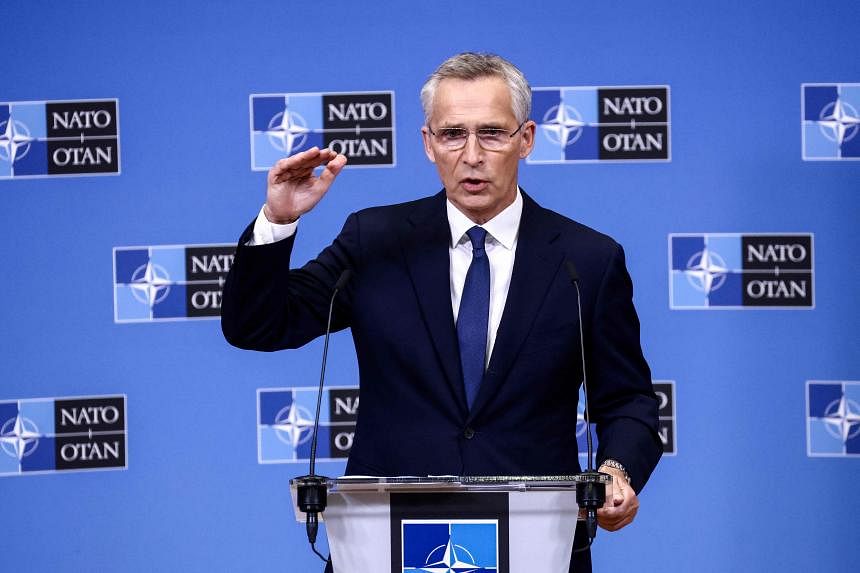BRUSSELS - Nato told Moscow on Tuesday that it would meet attacks on allies' critical infrastructure with a "united and determined response" and was monitoring Russia's nuclear forces closely as the country was "losing on the battlefield" in Ukraine.
Nato Secretary-General Jens Stoltenberg said ahead of a two-day meeting of the Western alliance's defence ministers in Brussels that it had not seen any changes in Russia's nuclear posture, but was "vigilant".
Stoltenberg described Russia's missile strikes on civilians in Ukraine on Monday as a sign of weakness.
"Russia is actually losing on the battlefield," he told a news conference, saying it was responding with "indiscriminate attacks" to Ukrainian advances.
That view was echoed by US ambassador to Nato Julianne Smith.
"President (Vladimir) Putin is failing to meet his strategic objectives on the ground and this has been a reoccurring theme for him personally since this war started," she told an online briefing.
The alliance will proceed with its annual nuclear preparedness exercise "Steadfast Noon" next week, in which Nato air forces practise the use of US nuclear bombs based in Europe with training flights, without live weapons.
Cancelling the drills because of the war in Ukraine would send a "very wrong signal", Stoltenberg said.
Russia has made veiled threats of using nuclear weapons against Ukraine, which it invaded on Feb 24 in what it calls a "special military operation" to demilitarise its neighbour.
"It's an exercise to ensure that our nuclear deterrent remains safe, secure and effective," he said.
Nato's military strength, he said, was the best way to prevent any escalation of tensions.
Stoltenberg also pledged to boost the protection of critical infrastructure in response to the attack on the Nord Stream gas pipelines, saying Nato had already doubled its presence in the Baltic and the North Seas to over 30 ships supported by aircraft and undersea activities.
"A deliberate attack against allies' critical infrastructure will be met with a united and determined response," Stoltenberg said.
It remains unclear who was behind the attack on the Nord Stream pipelines.
Stoltenberg also urged Belarusian President Alexander Lukashenko to stop his country's "complicity" in an illegal conflict.
Lukashenko said on Monday he had ordered troops to deploy with Russian forces near Ukraine in response to what he said was a clear threat to Belarus from Kyiv and its backers in the West.
Military experts see this as a potential attempt to stretch Ukrainian forces.
US to expedite shipment of Nasams air defences to Ukraine
The United States meanwhile is speeding up shipment of two advanced air defence systems to Ukraine amid stepped-up pleas by President Volodymyr Zelensky for the West to supply more - and more advanced - weaponry in the fight against Russia.
Raytheon Technologies will accelerate assembly of the National Advanced Surface-to-Air Missile System (Nasams) units by using existing parts instead of building the weapon from scratch, the Pentagon said in a statement. The US is also contracting for more parts under the Ukraine Security Assistance Initiative (USAI).
"We're using a number of tools to move funds and accomplish the contracting process quickly," the Pentagon said in a statement Tuesday. "We're focused on acquisition speed, and this is one example of our ability to work quickly with industry to accelerate delivery, by using some existing parts, and contracting under the USAI for additional parts."
Zelensky has said that air defence is Ukraine's top priority in the battle against Putin's forces, a call that gained urgency after Russia escalated missile barrages in recent days, including with attacks on the capital Kyiv and other civilian targets.
In a call Monday with Zelensky, President Joe Biden said the US would continue providing Ukraine the support it needs, "including advanced air defence systems", according to the White House.
The White House statement did not specify what systems Biden was talking about, but the exchange highlighted the pressure the US has come under from Ukraine to supply the country with longer-range anti-air and anti-missile systems.
The Nasams, developed with Kongsberg Defence and Aerospace of Norway, is one of Nato's most widely used air-defence systems and protects the Washington region. It will be delivered within several weeks, the Pentagon said.
Raytheon spokesman Chris Johnson said components for the Nasams are made in a number of locations, including Mississippi, California, Arizona and Norway.
An additional two systems were put on contract in August but are being built new and will take until 2024 to complete. Four more, to be built at a later date, have also been committed for Ukraine.
The Nasams fires AIM-120 AMRAAM missiles - one of the world's most widely sold air-to-air weapons for fighter jets - from ground-mobile canisters. REUTERS, BLOOMBERG

